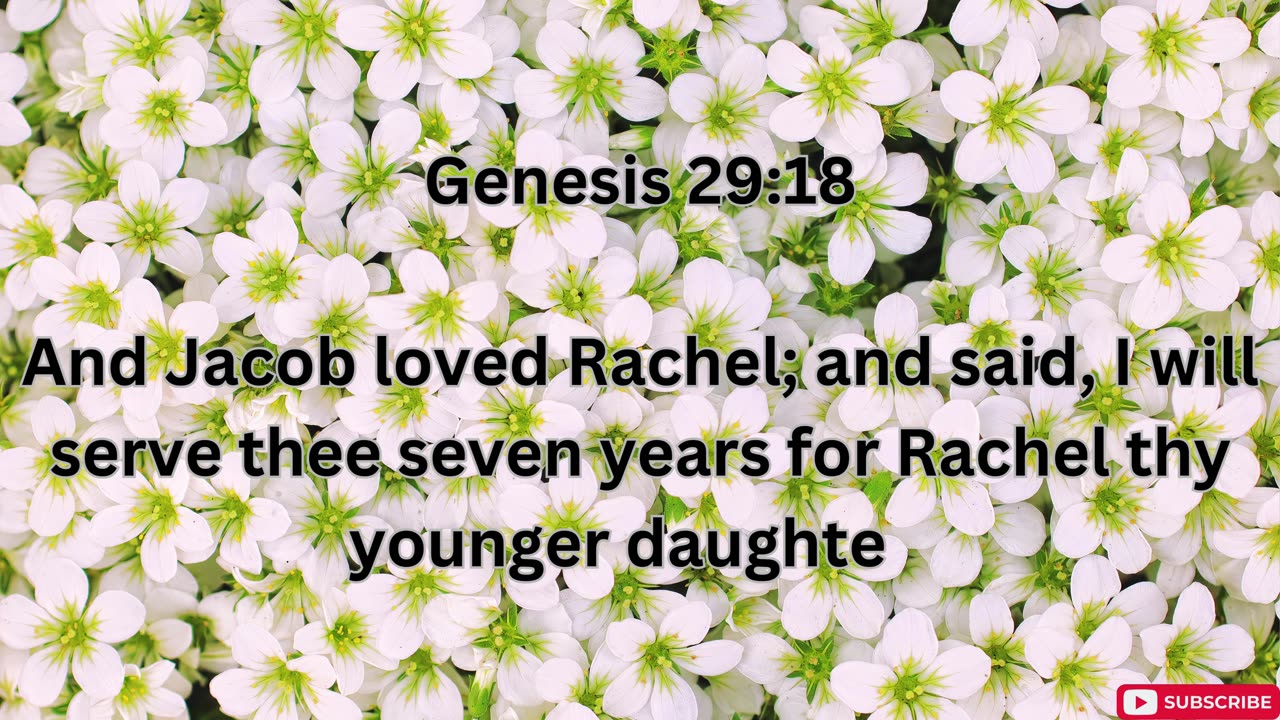Premium Only Content

"Jacob's Journey to Haran: Love, Deception, and the Birth of Israel's Tribes" genesis 29.
Genesis 29:1-35 tells a rich and multi-faceted story pivotal in the broader narrative of the Bible. This chapter is not only about personal relationships but also sets the stage for the establishment of the tribes of Israel. Here’s a detailed breakdown of the chapter:
Verses 1-14: Jacob Meets Rachel
Jacob's Journey:
Jacob continues his journey to Paddan-aram, also known as Haran, where he seeks his mother's family. This is a continuation of his flight from Esau after receiving Isaac's blessing.
Jacob arrives at a well, reminiscent of other significant biblical encounters at wells.
Encounter at the Well:
Jacob meets shepherds waiting to water their flocks. They inform him that they are from Haran and know his uncle, Laban.
Rachel, Laban's daughter, arrives with her father's sheep. Jacob is immediately struck by her beauty and helps her by rolling the stone away from the well's mouth, showing both his strength and willingness to assist.
Family Reunion:
Jacob reveals his identity to Rachel, who runs to tell her father. Laban warmly welcomes Jacob, bringing him into his home and treating him as family.
Verses 15-30: Jacob's Marriage and Laban's Deception
Jacob's Love for Rachel:
Jacob agrees to work for Laban for seven years in exchange for marrying Rachel. The text emphasizes Jacob's deep love for Rachel, making his service seem brief to him.
The Wedding Switch:
After the seven years, Laban deceives Jacob by substituting Leah, Rachel's older sister, as the bride. Jacob only realizes the switch the morning after the wedding night, highlighting the cultural and personal shock of the deception.
Laban justifies his actions by citing the local custom that the elder daughter must marry before the younger.
Second Marriage:
Jacob agrees to work another seven years for Rachel. After completing Leah's bridal week, he marries Rachel as well. This sets up a complex familial and relational dynamic, as Jacob now has two wives.
Verses 31-35: Leah and Rachel's Childbearing
God's Blessings and Rivalry:
God sees Leah's unloved status and opens her womb, while Rachel remains barren. This divine intervention underscores the ongoing theme of God favoring the marginalized.
Leah bears four sons: Reuben, Simeon, Levi, and Judah. Each name reflects Leah’s hope and emotional state, expressing her desire for her husband's love and her gratitude to God.
Foundational Tribes:
The birth of these sons begins the fulfillment of God's promise to Jacob to make his descendants numerous. These sons will become the progenitors of some of the tribes of Israel.
Key Themes and Reflections
Love and Labor: Jacob's deep love for Rachel drives him to endure years of hard labor, reflecting themes of dedication and the lengths one will go for love.
Deception and Consequences: Laban's deception mirrors the earlier deceit Jacob employed against Esau, illustrating the recurring motif of trickery and its repercussions in the Bible.
Divine Favor: Leah's story highlights God's compassion for the unloved and overlooked, showing that divine favor often rests with those who are marginalized.
Family Dynamics and Legacy: The chapter sets the stage for the future rivalry between Leah and Rachel, which will have significant implications for their children and the formation of Israel's tribes.
Summary
Genesis 29:1-35 encapsulates a journey of love, deceit, and divine blessing, weaving together the personal struggles of Jacob, Leah, and Rachel with the larger narrative of God's plan for Israel. The chapter not only introduces key characters and their relationships but also sets the foundational dynamics for the tribes of Israel, revealing how personal and divine actions interweave to shape the destiny of a nation.
This passage's complexity and richness provide deep insights into human emotions, cultural practices, and divine providence, making it a pivotal chapter in the Genesis narrative.
-
 0:09
0:09
secret of faith in jesus christ.
14 days ago« L’autorité de l’enseignement de Jésus » Marcos 1:22 #shorts #youtube #ytshorts #shortvideo #yt
5 -
 LIVE
LIVE
SpartakusLIVE
5 hours agoFriday Night HYPE || WZ Solos, PUBG, and maybe even OFF THE GRID?!
3,301 watching -
 LIVE
LIVE
megimu32
1 hour agoOFF THE SUBJECT: FAFO FRIDAY - Bodycam Madness + Mortal Kombat Mayhem!
1,499 watching -
 LIVE
LIVE
I_Came_With_Fire_Podcast
8 hours agoTRUMP WANTS TO KILL TRANS KIDS | CHINA IN TROUBLE | NYC IS RETARDED | WHO WILL WIN THE MIDTERMS
1,450 watching -
 2:05:52
2:05:52
TimcastIRL
2 hours agoTrump Russia HOAX DECLASSIFIED, Obama Officials EXPOSED In “TREASONOUS CONSPIRACY”
120K76 -
 DVR
DVR
SavageJayGatsby
3 hours agoLockdown Protocol - Wedding in 3 Months! - Halftway to 100!
21.1K -
 2:41:27
2:41:27
Mally_Mouse
6 hours agoFriend Friday!! - Let's Play! - Lockdown Protocol
19.2K4 -
 9:43
9:43
MattMorseTV
5 hours ago $2.32 earnedTulsi just DROPPED a BOMBSHELL.
22.2K34 -
 LIVE
LIVE
SynthTrax & DJ Cheezus Livestreams
14 hours agoFriday Night Synthwave 80s 90s Electronica and more DJ MIX Livestream Knight Ride Edition
178 watching -
 2:31:18
2:31:18
Laura Loomer
5 hours agoEP134: EXPOSED: Microsoft Allowed China Access To DOD Cyber Systems
149K63